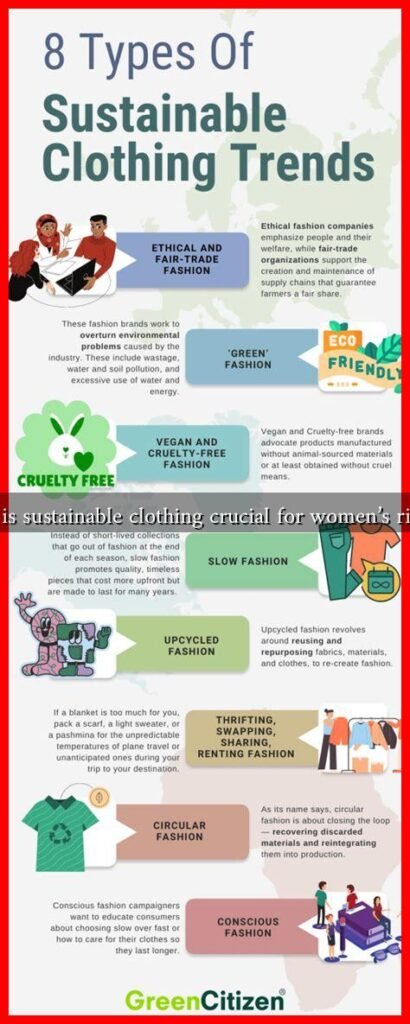-
Table of Contents
Why is Sustainable Clothing Crucial for Women’s Rights?
The fashion industry is one of the largest and most influential sectors globally, yet it is also one of the most detrimental to both the environment and human rights. As the conversation around sustainability grows, it becomes increasingly clear that sustainable clothing is not just an environmental issue; it is also a critical component of women’s rights. This article explores the intersection of sustainable fashion and women’s rights, highlighting why sustainable clothing is essential for empowering women worldwide.
The Impact of Fast Fashion on Women
Fast fashion has revolutionized the clothing industry, making trendy apparel accessible to the masses. However, this convenience comes at a significant cost, particularly for women. The majority of garment workers are women, often employed in developing countries under exploitative conditions. Here are some alarming statistics:
- According to the International Labour Organization (ILO), over 80% of garment workers are women.
- Many of these women earn less than $3 a day, far below the living wage.
- Reports indicate that women in the garment industry face high rates of harassment and unsafe working conditions.
Fast fashion brands often prioritize profit over ethical labor practices, leading to a cycle of poverty and exploitation. Sustainable clothing, on the other hand, promotes fair labor practices and empowers women by ensuring they receive fair wages and work in safe environments.
Empowerment Through Ethical Fashion
Sustainable clothing brands often prioritize ethical practices, which can significantly impact women’s rights. By supporting these brands, consumers can contribute to a more equitable fashion industry. Here are some ways sustainable fashion empowers women:
- Fair Wages: Sustainable brands often pay their workers a living wage, allowing women to support their families and invest in their futures.
- Safe Working Conditions: Ethical brands prioritize the health and safety of their workers, reducing the risk of workplace accidents and harassment.
- Skill Development: Many sustainable fashion initiatives focus on training women in various skills, from sewing to business management, fostering independence and self-sufficiency.
For example, the brand MADE works with women in Africa to create sustainable clothing while providing them with training and fair wages. This model not only supports the local economy but also empowers women to take control of their financial futures.
Environmental Sustainability and Women’s Rights
The environmental impact of the fashion industry disproportionately affects women, particularly in developing countries. Women are often the primary caregivers and are responsible for sourcing water and food for their families. As climate change exacerbates environmental degradation, women face increased challenges. Sustainable clothing can mitigate these issues in several ways:
- Reducing Pollution: Sustainable brands often use eco-friendly materials and processes, reducing pollution that disproportionately affects women and children.
- Conserving Resources: By promoting sustainable practices, the fashion industry can help conserve water and other resources that are vital for women’s livelihoods.
- Community Resilience: Sustainable fashion initiatives can strengthen communities, making them more resilient to climate change and economic instability.
For instance, the Fair Trade movement emphasizes sustainable practices that benefit both the environment and the workers, many of whom are women. By supporting Fair Trade products, consumers can contribute to a more sustainable and equitable world.
Conclusion: A Call to Action
Sustainable clothing is not merely a trend; it is a vital movement that intersects with women’s rights and empowerment. By choosing sustainable fashion, consumers can support ethical labor practices, promote environmental sustainability, and empower women globally. The fashion industry has the potential to be a force for good, but it requires collective action from consumers, brands, and policymakers.
As we move forward, it is crucial to advocate for sustainable practices in fashion and support brands that prioritize women’s rights. Together, we can create a more equitable and sustainable future for all.

